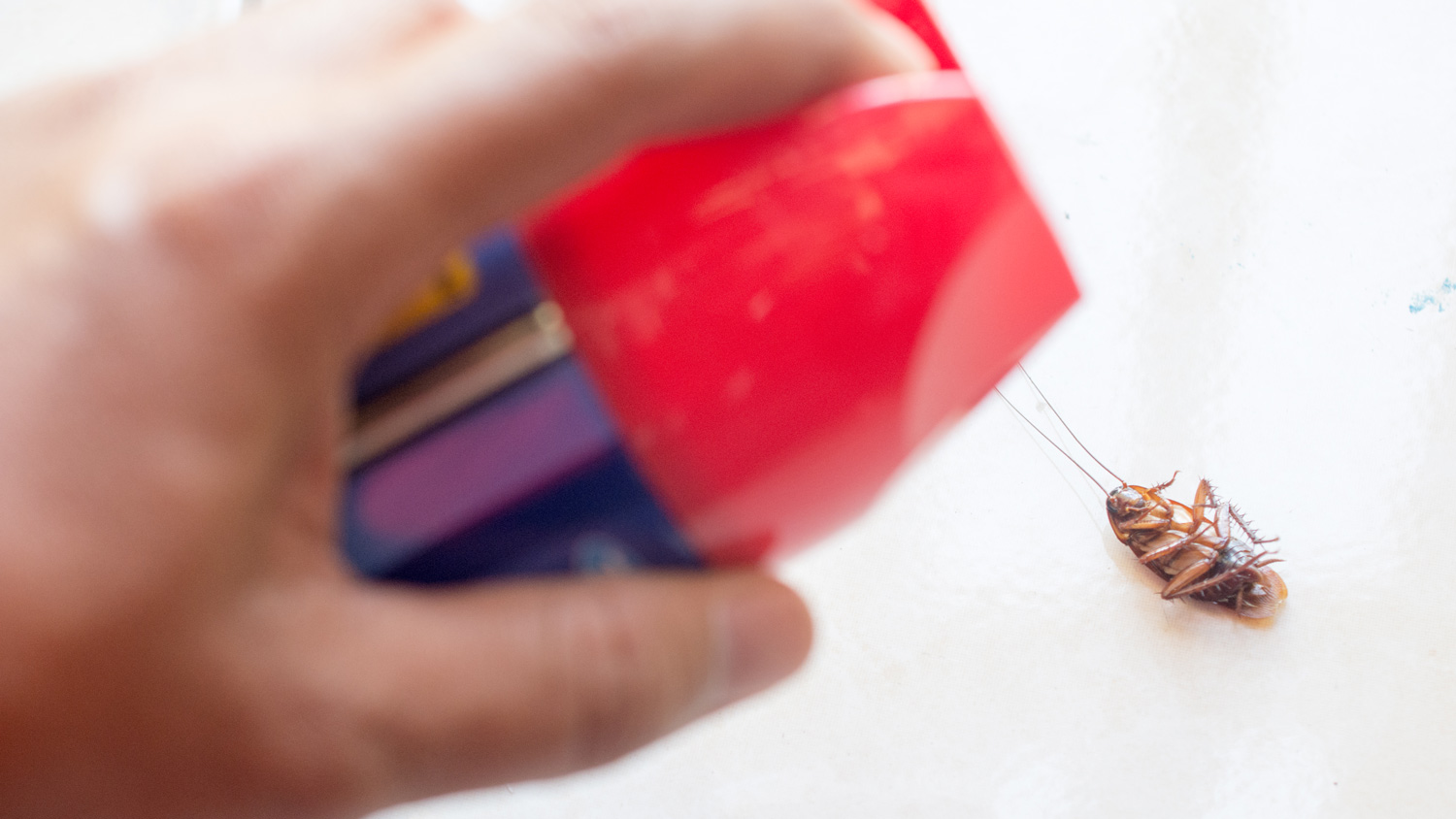What Do Cockroaches Eat?
Learn more about the diet preferences of this household pest


Cockroaches eat both plants and animals—and nearly everything else.
Seal off food sources and maintain a clean house to keep cockroaches away.
Call a professional exterminator to ward off a potential invasion.
What do cockroaches eat? Well, everything. It might seem like the punchline to a gross joke, but it’s true: Cockroaches are omnivores. Unlike humans whose dietary preferences are restricted to the food pyramid, cockroaches seem to have an appetite for everything.
Still, there’s a way of controlling their multiple food sources in your home so they’re forced to move on to find their next meal. Keep reading to learn more about what cockroaches eat.
Eating Habits of Cockroaches

Unlike other foodies with more discerning palates, cockroaches eat plants, animals, and nearly everything in between. Whether there are crumbs on the counter or a pile of cardboard boxes in your basement, there might as well be a sign that says “cockroach buffet” on them all. They especially like to nosh on meats, starches, sweets, and anything greasy.
Cockroaches also won’t say no to non-food items made from organic material of plants and animals, like paper, cardboard, glue, leather, hair, and even soap. They’ll also eat other cockroaches and even feces, as well as their own shed skins. Since most cockroaches can’t fly, they have to scavenge for their next meals.
How Long Can Cockroaches Last Without Food?
Despite their voracious appetites, American cockroaches can go about two or three months without eating a bite, but they’ll only get by for a month without water. German cockroaches, which are more commonly found species in households, can last around 1½ months without food but less than two weeks without water.
What Attracts Roaches to Your Home?
Wondering why roaches are attracted to your home? These pests are searching for food, water, and shelter, and these are the places they love to feast:
Dirty dishes
Garbage
Open pet food
Tall grass
Piles of leaves or debris
Moist areas like leaky pipes
Standing water like puddles
How Do You Get Rid of Cockroaches?

So now that you know cockroaches will stick around whether there’s food or not, you’re probably thinking: What do I do to get rid of cockroaches? Here are some tips.
Cut Off the Food Source
As with all pests, food is still the source of your cockroach problem. Just because these nasty insects already filled their bellies doesn’t mean they won’t scope out their next meal. That’s why it’s important to tightly seal food and store it appropriately. Be sure to place garbage in sealed cans and close all pet food containers.
Keep Up with Housekeeping
If you drop food or spill a drink, wipe it up as soon as possible to avoid enticing any pest, not only cockroaches. Keep your house, especially your kitchen, clean and tidy. The same advice applies to storage areas in your home, like your attic, basement, and garage.
Remember, cockroaches eat just about anything, like that pile of boxes you need to leave out for recycling pickup. Aside from munching on cardboard, they’ll use it to burrow in and find places to hide, so get garbage out of your house quickly.
Seal Cracks and Openings
The best pest control prevention is to ensure cockroaches can’t get into your house in the first place. Whether you do it as a proactive measure or as a reactive measure to seeing a critter or two around your house, do a walk of the perimeter, inside and out. Seal or caulk up any cracks and openings around windows and doors and in the foundation.
Use a Repellent
It’s normal to see the occasional roach or spider in your home. You can likely stop a few bugs in their tracks with chemical-based or natural cockroach repellents purchased at the store or online.
Chemical-based repellents are effective yet powerful, so read the label and understand any safety precautions before using them—some are too dangerous to use around pets or small children. You could try to spray some essential oils—rosemary and mint are known for their insect-repellent properties—but keep in mind that though these are gentler, essential oils can still be harmful to pets.
Hire a Professional Exterminator
A single cockroach sighting might not mean an infestation is imminent—but then again, it might. As with many household issues, early and immediate action is important, so be vigilant whenever you see any household pests lurking about.
The best way to get rid of roaches is to hire a professional pest control service for advice or an inspection. Then, the professional inspector or exterminator will evaluate the status of your roach infestation and determine the best treatment plan. Keep in mind that professional roach treatment costs $100 to $600 per treatment, depending on the size, severity, and location of the infestation.





- Pest Control Services
- Ant Exterminators
- Mosquito Control Companies
- Rodent Control
- Termite Control
- Bee Removal
- Animal Control
- Bed Bug Control
- Pest Inspection
- Flea Control
- Raccoon Control
- Skunk Control
- Spider Control
- Cockroach Control
- Bird Control
- Bat Control
- Opossum Control
- Snake Control
- Groundhog Removal
- 24 Hour Pest Control Services
- Bug Control
- Fumigation Companies
- Termite Tenting
- Lawn Pest Control Services
- What Attracts Roaches To Your Home?
- Can Cockroaches Fly and Jump?
- 4 Types of Health Problems Caused by Cockroaches
- Water Bug vs. Cockroach: What’s the Difference?
- What Does a Roach Look Like? Your Guide to Identifying These Pests
- When To Call An Exterminator for Roaches: What You Need to Know
- How to Get Rid of Roaches: A Complete Guide
- 7 Tips to Help Ward Off a Cockroach Infestation
- What to Expect After an Exterminator Sprays for Roaches
- What Kills Cockroaches Instantly?










